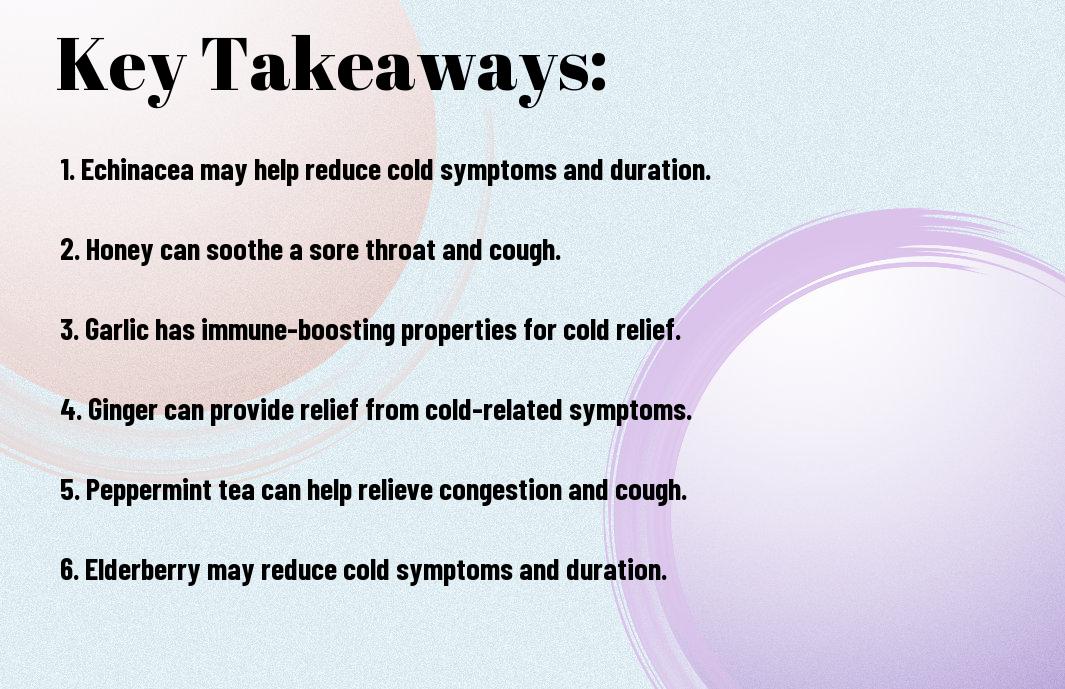Most individuals experience the discomfort of a common cold at some point, but before reaching for over-the-counter medications, consider the natural healing power of herbs. Herbal remedies can provide relief from symptoms like congestion, sore throat, and cough, while also boosting the immune system to help fight off the virus causing the cold. In this informative guide, we will explore some effective herbal remedies that have been used for centuries to treat common colds and promote overall wellness.
Key Takeaways:
- Natural Remedies: Herbal remedies can be effective in relieving common cold symptoms.
- Immune Support: Certain herbs like elderberry, echinacea, and astragalus can help boost the immune system.
- Soothing Properties: Herbs such as ginger, garlic, and thyme have soothing properties that can help alleviate cold symptoms.
The Science Behind Herbal Remedies
How Herbs Interact with the Body
Behind the effectiveness of herbal remedies for common colds lies in the way these natural plants interact with our bodies. When ingested, herbs release active compounds that can help strengthen the immune system, fight off viruses, and reduce inflammation. These bioactive substances work synergistically to provide relief from cold symptoms and promote overall wellness.
The Role of Antioxidants and Anti-Inflammatory Compounds
Any effective herbal remedy for common colds contains a variety of antioxidants and anti-inflammatory compounds. These plant-based nutrients play a crucial role in reducing oxidative stress, fighting free radicals, and decreasing inflammation in the body. By incorporating herbs rich in these beneficial compounds into your natural cold remedies, you can support your immune system and alleviate symptoms more effectively.
Antioxidants help protect your cells from damage caused by free radicals, which can weaken the immune system and make you more susceptible to infections. By including herbs like echinacea, elderberry, and ginger in your regimen, you can harness the power of antioxidants to boost your body’s defenses and speed up recovery from common colds.
Top Herbal Remedies for Common Colds
Echinacea: The Immune System Booster
For centuries, echinacea has been used as a remedy for common colds due to its ability to boost the immune system. This powerful herb can help reduce the severity and duration of cold symptoms by enhancing the body’s natural defense mechanisms.
Peppermint: Soothing Congestion and Coughs
For those suffering from colds with congestion and coughs, peppermint is a wonderful herbal remedy. Peppermint contains menthol, which can help soothe a sore throat, open up sinuses, and calm coughing fits.
Peppermint not only provides relief from symptoms but also has antiviral properties that can help fight off the virus causing the cold, making it an excellent addition to your natural cold-fighting arsenal.
Ginger: Reducing Inflammation and Fever
Fever accompanying a cold can leave you feeling miserable, but ginger can help. Ginger has anti-inflammatory properties that can reduce inflammation in the body, including in the respiratory tract, providing relief from symptoms like sore throat and congestion.
Another benefit of ginger is its ability to help reduce fever by promoting sweating, which can help the body eliminate toxins and regulate body temperature naturally.
Respiratory Health and Herbal Support
Now, when it comes to supporting respiratory health during a common cold, herbal remedies can provide powerful relief. From easing dry coughs to soothing irritated throats, certain herbs have been traditionally used to promote respiratory wellness.
Thyme: A Natural Expectorant
Herbalists often recommend thyme for its natural expectorant properties. Thyme contains compounds that help loosen mucus, making it easier to expel from the lungs. You can enjoy thyme as a tea or use it in steam inhalation to help clear congestion and support healthy breathing.
Sage: Easing Congestion and Sore Throats
The use of sage for respiratory issues dates back centuries. The herb is known for its ability to ease congestion and soothe sore throats. Sage contains volatile oils that have antimicrobial properties, making it a beneficial herb for fighting off infections in the respiratory tract.
Easing respiratory discomfort, sage can be consumed as a tea or used as a gargle for a sore throat. Its pleasant taste and soothing effects make it a popular choice for respiratory support.
Licorice Root: Soothing Respiratory Irritation
To ease respiratory irritation, licorice root is a go-to herb. Licorice root contains demulcent properties, which help to coat and soothe the respiratory tract. This can be especially beneficial for calming coughs and reducing inflammation in the lungs.
Understanding the benefits of licorice root for respiratory health can help you find relief during a common cold. Whether consumed as a tea or in supplement form, licorice root offers anti-inflammatory and antibacterial benefits that support overall respiratory wellness.
Herbal Teas for Cold Relief
All around the world, herbal teas have been used for centuries to help alleviate common cold symptoms. Whether you’re looking to soothe a sore throat, boost your immune system, or just relax, these herbal remedies can provide relief and comfort during cold season.
Lemon and Honey: A Soothing Combination
Honey and lemon are a classic combination for cold relief. Honey has antimicrobial properties that can help soothe a sore throat and suppress coughing. When paired with the vitamin C in lemon, this mixture can provide immune-boosting benefits to help you feel better faster.
Elderberry: Antiviral Properties and Immune Support
On top of being a delicious fruit, elderberry is known for its antiviral properties and immune-boosting benefits. Elderberry syrup or tea can help reduce the duration and severity of cold symptoms by stimulating the immune system to fight off the virus more effectively.
With its rich content of antioxidants and vitamin C, elderberry is a popular choice for those looking to support their immune system during cold and flu season.
Yarrow: Reducing Fever and Inflammation
Lemon balm is another herbal remedy that can help reduce fever and inflammation associated with colds. It has anti-inflammatory properties that can help soothe aches and pains, while also aiding in reducing fever by promoting sweating.
Feverfew is a natural analgesic that can help alleviate headaches and body aches that often accompany a cold. It is commonly used in teas to help provide relief from these uncomfortable symptoms.
Combining Herbs for Maximum Benefit
Unlike pharmaceutical drugs that often target just one symptom or aspect of a cold, herbal remedies have the advantage of offering a holistic approach to combating the common cold. By combining various herbs, you can create a synergistic effect that boosts the immune system, reduces inflammation, and provides symptom relief.
Blending Herbs for Synergistic Effects
To harness the power of multiple herbs, consider creating blends that complement each other’s properties. For example, combining elderberry for its immune-boosting effects with ginger for its anti-inflammatory properties can create a powerful remedy for cold symptoms. Experiment with different combinations and ratios to find the blend that works best for you.
Creating Customized Herbal Remedies
Maximum benefit can be achieved by creating customized herbal remedies tailored to your specific needs. Consult with a trained herbalist or naturopath to determine which herbs are best suited for your constitution and symptoms. They can help you create a formula that addresses your individual needs and optimizes the effectiveness of the herbs.
Herbs such as echinacea, garlic, and turmeric can be incorporated into personalized remedies to target specific aspects of the cold, such as boosting the immune system, fighting off viruses, and reducing inflammation. By creating a customized blend, you can ensure that you are receiving the maximum benefits from each herb.
Safety Precautions and Contraindications
After exploring 14 All-Natural Home Remedies for Fast Cold & Flu Relief, it’s important to consider safety precautions and possible contraindications when using herbal remedies for common colds. While herbs can offer natural relief, it is crucial to be aware of potential risks and interactions, especially if you have underlying health conditions or are taking medications.
Allergic Reactions and Interactions with Medications
One crucial consideration when using herbal remedies for colds is the possibility of allergic reactions or interactions with medications. Some herbs may trigger allergic responses in certain individuals, so it’s vital to start with small doses and monitor your body’s reaction. Additionally, some herbs can interact with medications, either reducing their effectiveness or intensifying their effects. If you are taking any prescription medications, consult with a healthcare provider or a qualified herbalist before incorporating herbal remedies into your cold treatment regimen.
Pregnancy, Breastfeeding, and Pediatric Use
The use of herbal remedies for common colds during pregnancy, breastfeeding, and in pediatric populations requires special consideration. Pregnant women, lactating mothers, and young children have unique physiological needs and vulnerabilities, so extra caution is advised when using herbs for cold relief in these groups. It is recommended to seek guidance from a healthcare professional knowledgeable about herbal medicine before administering any herbal remedies to pregnant or breastfeeding individuals and children.
The safety and appropriate dosage of herbs for colds in pregnant women, breastfeeding mothers, and children are areas where individualized guidance and supervision are crucial, as some herbs may not be suitable or safe for these specific populations. It’s crucial to prioritize the well-being and health of both the mother and the child when considering herbal remedies for common colds.
Contraindications:
Individuals with allergies, those taking medications, pregnant women, breastfeeding mothers, and pediatric populations should exercise caution and seek professional guidance before using herbal remedies for common colds. Safety, monitoring for allergic reactions, and awareness of potential interactions are crucial for the responsible use of herbal remedies.

Final Words
Conclusively, exploring the world of herbal remedies for common colds can be a wise and natural approach to managing symptoms and promoting overall health. By harnessing the power of plants like echinacea, ginger, and elderberry, individuals can potentially boost their immune systems and find relief from cold symptoms. As always, it’s crucial to consult with a healthcare provider before starting any new herbal remedy regimen, especially if you are taking medications or have underlying health conditions. With proper guidance and knowledge, incorporating herbal remedies into your cold-fighting arsenal can be a valuable addition to your wellness routine.
FAQ
Q: What are herbal remedies for common colds?
A: Herbal remedies for common colds are natural plant-based remedies that can help alleviate symptoms such as congestion, sore throat, and cough associated with the common cold.
Q: What are some examples of herbal remedies for common colds?
A: Some examples of herbal remedies for common colds include Echinacea, elderberry, ginger, garlic, and peppermint. These herbs have anti-inflammatory and immune-boosting properties that can help support the body during a cold.
Q: Are herbal remedies safe for treating common colds?
A: When used appropriately and in moderation, herbal remedies for common colds are generally safe for most people. However, it’s important to consult with a healthcare provider or a qualified herbalist before using herbal remedies, especially if you are pregnant, nursing, or taking medications.

